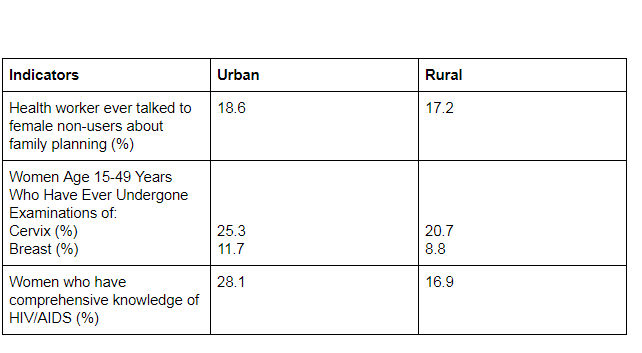Sexual health, hygiene and my reproductive rights as a woman
 I grew up in Ahmedabad, one of the metro cities of India into a well educated family. My background is relevant here as I belong to a well-informed urban family who have inculcated the modern lifestyle while retaining traditional values and beliefs. It was after I hit puberty that I got numerous messages about what it is to be a girl and what kind of woman I should aspire to be. It was a part of the training for my future that would involve marriage and possibly children. Yes I had a free hand in travelling to new places and learning new things. I grew up as a confident independent girl who was good in academics, had several friends and family members. However, now at the age of 31; being a wife and a mother; I am pondering on the one aspect of growing up that got missed: comprehensive information on the sexual health, hygiene and my reproductive rights as a woman.
I grew up in Ahmedabad, one of the metro cities of India into a well educated family. My background is relevant here as I belong to a well-informed urban family who have inculcated the modern lifestyle while retaining traditional values and beliefs. It was after I hit puberty that I got numerous messages about what it is to be a girl and what kind of woman I should aspire to be. It was a part of the training for my future that would involve marriage and possibly children. Yes I had a free hand in travelling to new places and learning new things. I grew up as a confident independent girl who was good in academics, had several friends and family members. However, now at the age of 31; being a wife and a mother; I am pondering on the one aspect of growing up that got missed: comprehensive information on the sexual health, hygiene and my reproductive rights as a woman.
As a girl and a woman with my background, I often wonder why the words such as “reproduction”, “feminine hygiene”, “reproductive health”, “sex”, “sexual relationships”, and so forth never entered into my family’s vocabulary. As I was growing up, I was curious to know some of these words and what does it mean. Many times I was confused and at times, attempted to gain knowledge through popular media, friends or self-exploration. This learning, which was at first confused, and later guided solely by self exploration, took years. The absence of cultural or social knowledge prevented me from learning about myself, my body and my feelings, and I often felt lonely and embarrassed.
As an adult, I had my share of experiences that prompted me to gain knowledge on women’s health that I had never thought about. Thank goodness for the Google baba that guided me not only through a complete pregnancy but an ectopic pregnancy, a miscarriage and a few infections. Needless to say, in this journey, the information from doctors and nurses were very useful but I felt empowered to have the information at my fingertips. I wish I had heard more about the topics such as “women and reproductive health”, “women and sexual-hormonal health”, or even simply “woman and her body” before I encountered these situations.
Having found that timely and correct information is equivalent to empowerment in this area, I would like to call upon the mothers, fathers, grandparents, mentors, and teachers in Indian community to become more open about this conversation with their teens, adolescents and young adults. We need to know about our bodies, about our reproductive health, our emotions and hormones attached to it and its relationship to oneself and one’s partner.
This may or may not feel relevant to you. You might want to wait longer to discuss such matters or might assume that the doctors would do this job if and when necessary. I would like to share a few statistics that can help us initiate this dialogue. Especially the need for women to be aware of and to act for their own health. Simple things like awareness and accessibility to get Pap Smear (Pap Test) and breast examination done periodically to prevent Cervical and Breast cancer respectively. According to the National Family Health Survey-4 (2015-2016) India fact sheet,

These statistics are from a representative sample of Indian States, this information is gathered from 699,686 women throughout India. The complete fact sheet can be accessed here that surveys women health condition at a comprehensive level. For this article, I chose a few data to show the lower percentage values that indicates the need to start discussing and guiding our women about their health. Besides, the data largely focuses on married people in the young age group. Experts believe that our teens today are also more aware and active compared to previous generations. So now the question is whether we start open discussions and debates or do we let the person figure out on their own? Do we fear that our young generation will use the knowledge in a wrong way or do we make our teens, adolescents and young adults empowered by imparting the information and letting them make healthy choices.
In the end, I wish we would be open about these topics and let information be accessible through daily conversations. Remember how we tried learning on our own, from our friends and their older siblings, TV, and internet. We know how incomplete and inaccurate that information could often be. Hence, let us start being comfortable at our own home with our young generation about sexuality and reproduction. Let’s not wait until something happens. Let them come to us if they are in doubt and engage in a candid conversation. In the end this is the information we all will need sooner or later in our process of becoming a mature and well informed adult.
Some useful tips: Use and teach appropriate terms and vocabulary while talking about sexual health and knowledge. Accept the curiosity around this topic in adolescents. Do not shush or quiet them when they ask questions Provide books and other learning materials that provide factual information. Be comfortable with yourself while talking; If you are embarrassed or ashamed it will be reflected in your conversation. Seek help of medical practitioners or counselling professionals when appropriate.
Originally published at poise7.
comments powered by Disqus